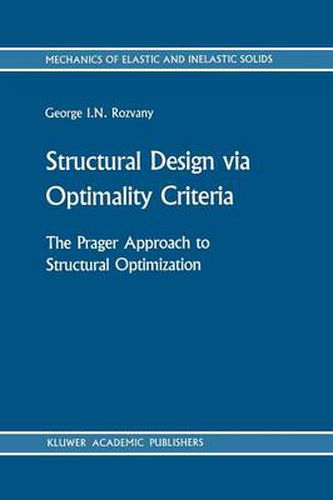Readings Newsletter
Become a Readings Member to make your shopping experience even easier.
Sign in or sign up for free!
You’re not far away from qualifying for FREE standard shipping within Australia
You’ve qualified for FREE standard shipping within Australia
The cart is loading…






This title is printed to order. This book may have been self-published. If so, we cannot guarantee the quality of the content. In the main most books will have gone through the editing process however some may not. We therefore suggest that you be aware of this before ordering this book. If in doubt check either the author or publisher’s details as we are unable to accept any returns unless they are faulty. Please contact us if you have any questions.
During the last two decades, research on structural optimization became increasingly concerned with two aspects: the application of general numeri- cal methods of optimization to structural design of complex real structures, and the analytical derivation of necessary and sufficient conditions for the optimality of broad classes of comparatively simple and more or less ideal- ized structures. Both kinds of research are important: the first for obvious reasons; the second, because it furnishes information that is useful in testing the validity, accuracy and convergence of numerical methods and in assess- ing the efficiency of practical designs.
(Prager and Rozvany, 1977a) The unexpected death of William Prager in March 1980 marked, in a sense, the end of an era in structural mechanics, but his legacy of ideas will re- main a source of inspiration for generations of researchers to come. Since his nominal retirement in the early seventies, Professor and Mrs. Prager lived in Savognin, an isolated alpine village and ski resort surrounded by some of Switzerland’s highest mountains. It was there that the author’s close as- sociation with Prager developed through annual pilgrimages from Australia and lengthy discussions which pivoted on Prager’s favourite topic of struc- tural optimization. These exchanges took place in the picturesque setting of Graubunden, on the terrace of an alpine restaurant overlooking snow-capped peaks, on ski-lifts or mountain walks, or during evening meals in the cosy hotels of Savognin, Parsonz and Riom.
$9.00 standard shipping within Australia
FREE standard shipping within Australia for orders over $100.00
Express & International shipping calculated at checkout
This title is printed to order. This book may have been self-published. If so, we cannot guarantee the quality of the content. In the main most books will have gone through the editing process however some may not. We therefore suggest that you be aware of this before ordering this book. If in doubt check either the author or publisher’s details as we are unable to accept any returns unless they are faulty. Please contact us if you have any questions.
During the last two decades, research on structural optimization became increasingly concerned with two aspects: the application of general numeri- cal methods of optimization to structural design of complex real structures, and the analytical derivation of necessary and sufficient conditions for the optimality of broad classes of comparatively simple and more or less ideal- ized structures. Both kinds of research are important: the first for obvious reasons; the second, because it furnishes information that is useful in testing the validity, accuracy and convergence of numerical methods and in assess- ing the efficiency of practical designs.
(Prager and Rozvany, 1977a) The unexpected death of William Prager in March 1980 marked, in a sense, the end of an era in structural mechanics, but his legacy of ideas will re- main a source of inspiration for generations of researchers to come. Since his nominal retirement in the early seventies, Professor and Mrs. Prager lived in Savognin, an isolated alpine village and ski resort surrounded by some of Switzerland’s highest mountains. It was there that the author’s close as- sociation with Prager developed through annual pilgrimages from Australia and lengthy discussions which pivoted on Prager’s favourite topic of struc- tural optimization. These exchanges took place in the picturesque setting of Graubunden, on the terrace of an alpine restaurant overlooking snow-capped peaks, on ski-lifts or mountain walks, or during evening meals in the cosy hotels of Savognin, Parsonz and Riom.